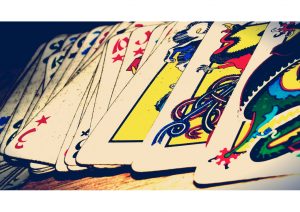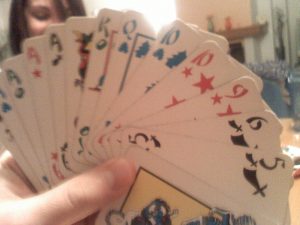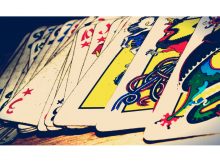Discovering a surprisingly addictive #CardGame imported from China. #Tichu

If you ever find yourself in Greece, it is highly unlikely that you will not notice any group of students passionately engaging in a Tichu session. Tichu is a Chinese card game that’s become the newest fad in Greece: especially in universities, learning how to play is essentially unavoidable. The game has become a favorite pastime – a Tichu card deck now decorates almost every table and is a necessary accessory in coffee houses. Its popularity even surpassed the one of the Greek version of backgammon as a necessary companion to a good cup of coffee.
But what is Tichu exactly? It’s a combination of Poker, Bridge and Daihinmin and it is played usually with 4 players – no more, no less. This might be a disadvantage if there’s 3 of you and nobody else is willing to sacrifice their valuable time to be part of your team, or if there’s the disagreeable possibility of someone being left out. The goal is reaching a certain amount of points: either 1000 or 500, depending on the time available. A game usually lasts up to an hour.
 The 56-card deck resembles a classical card deck, only in its Chinese version. There are 52 cards of four suits (Sword, Jade, Pagoda & Star), and another four special cards (Dog, Phoenix, Dragon, Mah Jong). These are distributed to all 4 players equally (there are two teams of two people). Getting rid of the cards on hand is the goal for each round, and cards that have been played are up for grabs: whoever has the strongest combination wins their points for their team.
The 56-card deck resembles a classical card deck, only in its Chinese version. There are 52 cards of four suits (Sword, Jade, Pagoda & Star), and another four special cards (Dog, Phoenix, Dragon, Mah Jong). These are distributed to all 4 players equally (there are two teams of two people). Getting rid of the cards on hand is the goal for each round, and cards that have been played are up for grabs: whoever has the strongest combination wins their points for their team.
At the beginning of the game, any player has the right to say ‘Tichu!’ which means that they think they will be the first one to get rid of their cards. If they do, that’s +100 points for their team, failing to do so however deducts the same amount of points. ‘Grand Tichu’ means the same thing, but the stakes are higher: 200 points. It is now time for the exchange: everyone has to give (and consequently, receive) 3 of their cards to each of the players. Usually, low value cards like 2 or 3 are given to the opponents, and stronger ones (special cards, high numbers) are reserved for the teammate. The game starts with the Mah Jong and whoever chances to have it starts the round. The Mah Jong does not necessarily have a numeric value, but the player can use it as a 1 if they wish. From then on, each player has to provide a higher numeral or combination from the one on the table; the player with the strongest cards takes them.
The number of possible combinations is not low, but the rules about which ones are most powerful are very similar to Poker. The cards that affect points are the following: 5, 10, K (10 points), Dragon (25 points), Dogs (-25 points).
Of course, this article is not exhaustive and not all the rules are explained in detail. The game is not too easy when it comes to learning how to play, but once you get the hang of it, it’s hard not to get addicted! Tichu is definitely a great option for any group of 4 people looking for a good card game, but it is also playble online. Be prepared, though: the Greek Tichu community is particularly active there!
Number of Players: 4
Game length: 20-30 or 40-50 minutes

Leave a Reply